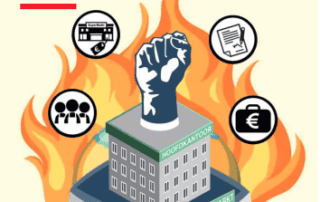Shooting with hail in preliminary relief proceedings is not rewarded
Recently, the verdict was published on Rechtspraak.nl regarding summary proceedings brought against the latter by a (former) franchisee of Bart’s Retail. The judgment dated 1 August 2013 (ENCLI: NL.RBGEL:2013:6441) of the District Court of Gelderland shows in particular that an advance on compensation is not lightly awarded in franchise relationships. Franchise disputes are mainly complex in nature and the existence of the (alleged) claim(s) is often insufficiently substantiated. Notwithstanding the urgency to be stated and the so-called restitution risk.
In this case, the franchisee accused the franchisor of providing incorrect sales forecasts and wrongly stating when entering into the franchise agreement that an asbestos problem found in the past would have been solved, while in the franchisee’s view this was not the case. With regard to the allegedly incorrect forecasts, the franchisor argued that it had only supplied historical figures which were compiled into a forecast and a financing application by the franchisee’s accountant. The role of the franchisor was limited to entering a few variables. That factual state of affairs was insufficiently contradicted by the franchisee. With regard to the alleged asbestos problem, it appeared from a report submitted by the franchisor that they are sufficiently aware of it was allowed to trust that the asbestos problems had been solved.
Also interesting is the consideration of the court that on the occasion of such preliminary relief proceedings it is not sufficient to rely on error, since error does not entail any liability for damages on the part of the other party of the erring party. After all, this also requires an unlawful act. However, the franchisee had also provided insufficient facts and/or circumstances that could lead to the conclusion that an unlawful act could also have been committed.
The franchisee also took the position that the necessary renovation work as a result of the need to remove asbestos would have resulted in loss of income, which should be eligible for compensation. However, the franchisee did not sufficiently substantiate that, in addition to the compensation already made, there would still be uncompensated damage.
Finally, the parties did not reach agreement regarding the resumption of operation after the renovation. As a result, the franchise relationship was eventually dissolved by the franchisor. In this respect too, the court concludes that the franchisee has not provided sufficient evidence from which it could be deduced that the dissolution was unjustified and whether damage was suffered.
The interlocutory proceedings conducted in the present case once again show that firing with hail in anticipation of proceedings on the merits will not quickly lead to a short circuit thereof. In my opinion, such summary proceedings should therefore be limited to modest and strictly necessary provisions in anticipation thereof.
Mr. J. Strong – Franchise attorney
Ludwig & Van Dam Franchise attorneys,franchise legal advice.
Do you want to respond? Mail to strong@ludwigvandam.nl

Other messages
Post non-competition ban without a signed franchise agreement
Is a franchisee bound by a post-competition ban without a ...
Post non-compete clause in hard franchising
The summary proceedings judge of the Amsterdam District Court ...
Does an agreed rent indexation always apply?
Many entrepreneurs were confronted with a significant rent increase ...
Ludwig & Van Dam in Distrifood Magazine about the Franchise Act
Interview about the current obstacles for independent supermarket entrepreneurs and ...
No franchise agreement, but membership of a cooperative
In certain cases, agreements made in a franchise agreement may ...
Post prohibition of competition and transfer of the business to the life partner
A franchisee is a company. The franchisee and the private ...







